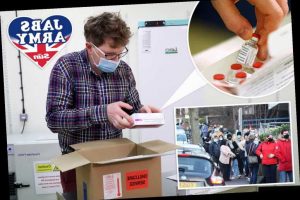Join Jabs Army now and help rollout Oxford's groundbreaking Covid vaccine

BORIS Johnson yesterday hailed the arrival of a life-saving jab — and predicted the war against coronavirus will soon be won.
The PM declared the new Oxford vaccine a “triumph of British science” as the first 530,000 doses were delivered to key hospitals.
⚠️ Read our coronavirus live blog for the latest news & updates
Sign up at nhsvolunteerresponders.org.uk
Bosses at the NHS were last night scaling up for tomorrow’s launch of the biggest immunisation programme in its history.
Despite the scale of the operation and the threat posed by a virulent new Covid variant, Mr Johnson is convinced the AstraZeneca vaccine will soon have the virus in retreat.
He said: “We know there are challenges still ahead of us over the coming weeks and months, but I’m confident this is the year we will defeat coronavirus and start building back better.”
Britain has ordered 100million doses of the vaccine — enough for 50million people. It means that along with the 40million doses of the Pfizer treatment, the UK has enough jab-power to protect the entire population.
The NHS will be the first health service in the world to deliver the new jab, which was approved by regulators only last week.
But NHS medics and an army of volunteers face a race against time to administer the vaccine before the virus wreaks further devastation.
Health Secretary Matt Hancock welcomed the arrival of the new jab as “a historic day and cause for celebration”.
The first batch arrived at Princess Royal Hospital in Haywards Heath, part of the Brighton and Sussex University Hospitals NHS Trust.
It is one of six hospital trusts that will start delivering the vaccine for the first few days under close monitoring conditions.
The others are the Royal Free and Guy’s and St Thomas’s in London, Oxford University Hospitals, University Hospitals of Morecambe Bay, Lancs, and the George Eliot Hospital in Nuneaton, Warwickshire.
Bulk supplies will then be sent to hundreds of GP-led services later in the week.
Hundreds of vaccination sites are due to come on stream, joining 700 already in operation.
The Army has been given the go-ahead to deploy hundreds of vaccination “surge teams” to help the mass roll-out.
They will be involved in transporting batches and even helping administer them.
Defence Secretary Ben Wallace has enough teams of combat medics ready to roll out 100,000 doses a day if required.
The military has been embedded at the NHS headquarters for the weeks.
Brigadier Phil Prosser, commander of 101 Logistics Brigade, has a desk on the top floor and has been chairing daily meetings with officials.
There is more than just the vaccine to deliver — with 12million pieces of equipment, including manuals, masks and surgical gloves.
How to sign up
VOLUNTEERS for the Jabs Army are being asked to first register online at nhsvolunteerresponders.org.uk
You will then receive an email with log-in details to sign up online.
Finally, you will be asked to download the GoodSAM app on a smartphone which will match you to a role in your area.
Services will be opening in the coming days and weeks, with different areas up and running at different times, so you might not be required on site for some weeks. Not everyone who signs up will need to be called upon.
You need to commit to only two six-hour shifts a month at a vaccination service, and no prior experience or qualifications are required.
You will work as part of a team that will include NHS staff and volunteers. The Royal Voluntary Service will conduct appropriate background checks.
Go to nhsvolunteerresponders.org.uk
And, if the PM’s earlier target of easing restrictions by Easter is to be met, vaccinations would have to run close to 1.5million a week by the end of the month and rise to more than 2million.
There are doubts whether AstraZeneca supplies can match that sort of demand.
But more Pfizer supplies are due next month, which makes the target realistic, if difficult.
The brigadier, experienced in crisis management and operational planning, has said: “The British Army soldier is proud to be part of the nation’s response to this unprecedented challenge.”
An MoD spokesman said: “The Armed Forces have personnel, including specialist planners, logisticians, and medics ready to support responses to the outbreak however required.”
The vaccination programme — the biggest in NHS history — has got off to a strong start
The Oxford vaccine is the second vaccine to be given the go ahead in the UK after roll-out of the Pfizer jab began last month.
As it can be kept at normal fridge temperature, it is easier to store and administer than the Pfizer treatment which needs cold storage at -70C.
NHS chief executive Sir Simon Stevens said: “The delivery of the Oxford AstraZeneca vaccine marks another first for the NHS, and a major milestone in humanity’s battle against coronavirus.
“The vaccination programme — the biggest in NHS history — has got off to a strong start, and by New Year’s Day we’d been able to vaccinate more people than the rest of Europe combined.
“Now we have a second, more versatile, jab in our armoury.”
Mr Hancock warned people to stay on guard, but added: “The vaccine is our way out and this huge achievement brings us a step closer to the normality we’ve all been working hard to reclaim.
“From tomorrow, the British public will begin to receive a second highly effective vaccine, starting with the most vulnerable and frontline care home and NHS staff — another significant milestone in the expansion of the vaccination programme.”
The NHS made history when Maggie Keenan became the first person in the world to be vaccinated against coronavirus outside of a clinical trial at Coventry Hospital on the December 8.
- Sign up at nhsvolunteerresponders.org.uk
GOT a story? RING The Sun on 0207 782 4104 or WHATSAPP on 07423720250 or EMAIL [email protected]
Source: Read Full Article









